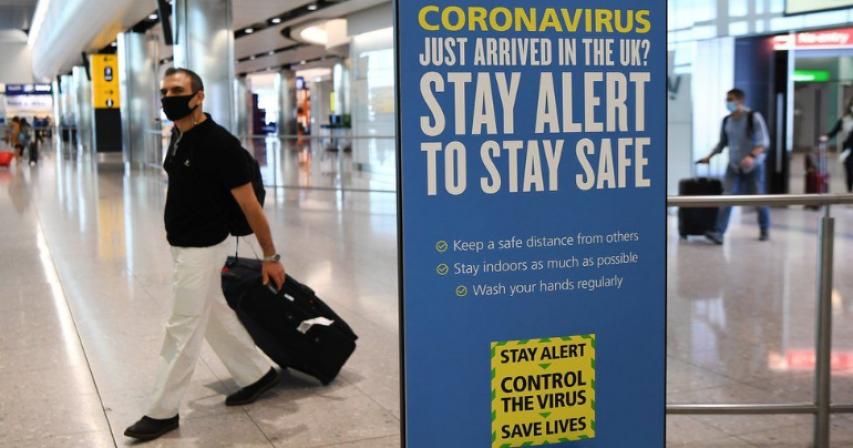Why is the UK bringing in travel testing?
- 3 years ago

SOURCE: BBC
The UK will soon require international arrivals to the UK to provide evidence of a recent negative coronavirus test.
Many countries have tightened their entry requirements recently, but already require passengers to be tested in some form, whether on arrival, before leaving their home country or a combination of the two.
So, why has it taken the UK so long to introduce these kinds of checks?
What led the government to change its mind on testing?
From Monday 18 January, incoming passengers will be required to show evidence of a recent negative coronavirus test (taken within 72 hours of departure) before they can travel to the UK.
But some people will be exempt, including hauliers, under-11s and those from countries whose infrastructure doesn't support testing.
The UK travel industry has been campaigning for months for a testing system to replace quarantine measures.
The government says it has acted now because of a new coronavirus variant identified in South Africa. There are concerns that imported cases could hamper the effectiveness of the UK lockdown and the vaccine rollout.
Mark Jit, Professor of Vaccine Epidemiology at the London School of Hygiene & Tropical Medicine, said modelling suggested travel restrictions such as pre-departure testing only made a difference in three scenarios.
These are if a country has very few domestic cases, if the virus is at a tipping point and about to grow exponentially, or "if you are trying to keep a new strain of coronavirus out of your country, and hardly anyone in your country has that strain yet".
But the new rules mean that even with a negative test, passengers will still have to self-isolate when they get to the UK.
Why do people still have to quarantine if they test negative?
Because the test risks missing some cases of coronavirus, the government says.
In November, the Home Office told an inquiry into its handling of the UK's borders that it had decided not endorse testing passengers arriving in the UK, "due to the long incubation period of the virus, which means there is a significant risk of false negative results when testing asymptomatic people, without any isolation period."
For this reason, the government claimed self-isolation was a safer option, with the potential to follow up with a test after a set period.
It now says that pre-departure testing will "provide a further line of defence".
What are the UK's other travel restrictions?
Since June 2020, the UK has required most incoming passengers to quarantine and to fill in a passenger locator form so that they can be contacted.
In December, the self-isolation period was brought down from 14 days to 10, while travellers to England were given the option to cut their quarantine to under a week, if they paid for a private test that came back negative.
People who have recently been in or transited through South Africa or some nearby countries are no longer allowed into the UK, unless they are British and Irish nationals or residents - who must self-isolate.
Arrivals from so-called "travel corridors", "high value" business travellers and certain professions do not have to quarantine at all.
Breaking quarantine rules is a criminal offence - with fines of £1,000 in England, Wales and Northern Ireland, and £480 in Scotland.
But questions have been asked about the level of checks and enforcement. By mid-November, police had fined just 223 people in England for breaking quarantine rules, despite investigating more than 1,000 potential breaches.
What are other countries doing?
International travel is increasingly restricted and other countries have closed borders or have increased the level of controls for people from the UK (because of the new UK variant of Covid-19).
France
Entry into France from the UK is only permitted for people resident in France or who must travel for essential reasons
All travellers from the UK, including children over 11, need to present a negative Covid test result (carried out no more than 72 hours before arrival)
UK arrivals must complete a 'sworn statement' form that they are not suffering from coronavirus symptoms and have not been in contact with confirmed cases in the preceding fortnight, and a signed 'travel certificate', with the reason for travel
Italy
Entry into Italy from the UK is only permitted for those with official residency in Italy or for an "absolute necessity", declared in writing
A negative Covid test result, (carried out no more than 72 hours before arrival) is required
You must also take a rapid Covid test or swab test at the airport. Regardless of the result, you have to report to the local health authorities on arrival, and you must self-isolate for 14 days
Germany
You must register your entry online in advance and this information has to be presented to the border authority.
People from a long list of high-risk countries must quarantine for 10 days
You can take a Covid test at the airport, at a doctor's or local testing facility. If it's negative, the quarantine can end on the fifth day. Covid testing at airports was free until 15 December 2020, but this is no longer the case
Greece
You must complete a Passenger Locator Form (PLF) at least 24 hours before travel. Failure to do so may result in your carrier not allowing you to travel, a 500 Euro fine on arrival or the Greek authorities not allowing you to enter the country
You must provide proof of a negative Covid test (carried out no more than 72 hours before arrival)
On arrival, you will also have to undergo a rapid covid test. Even with a negative result, UK travellers have to self-isolate for 10 days and undertake a further test at the end of their self-isolation
Comments